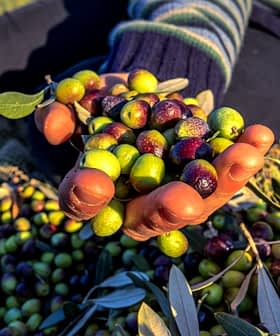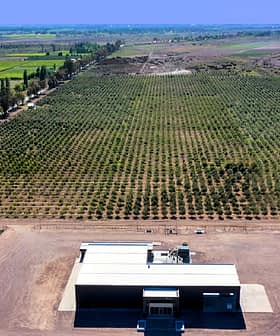Coronavirus Crisis Hits Small Producers Hardest in Portugal
Domestic consumption has dried up as restaurants close and hotel rooms sit empty. Exports have also dropped as countries around the world cancel their orders for Portuguese oil.
 Monte dos Valhascos - Amareleja (OOT Archive)
Monte dos Valhascos - Amareleja (OOT Archive)“We are feeling the crisis’ impact and we are going to feel it more,” Mariana Teles Branco, marketing and quality technician of the Center for the Study and Promotion of Alentejo Olive Oils (CEPAAL), told Olive Oil Times.
Like nearly every other country in the world, Portugal is being struck by the coronavirus pandemic and the country’s vibrant olive oil sector has not been spared from its negative consequences.
The closure of restaurants, hotels and small shops is having an impact. Those are important buyers at a national level and much of the olive oil won’t be sold because that channel has been interrupted.
The effect of the disease in the Iberian country, however, has so far been lower than in most of its European neighbors.
As to April 22, there were 21,379 Covid-19 cases and 762 deaths in Portugal, a rate of around seven deaths for every 100,000 people in a country with a population of little more than 10 million.
These data show a stark contrast with those of Spain, which has a rate of about 45 deaths for every 100,000; Italy, with a rate of roughly 40 fatalities per 100,000; and France, with a rate of 30 deaths for every 100,000.
See Also:Covid-19 UpdatesAccording to experts, the relatively early reaction of the Portuguese government has been crucial in order to slow down the spread of the disease.
Portugal was placed under a state of alert on March 13th and then under an even stricter state of emergency just five days later. At that moment, there were just three deaths due to the new coronavirus and 785 reported cases in the country. When Spain took similar measures, they already had 84 deaths.
For more than a month, Portugal has been living under a general lockdown, which, in practical terms, means that only strictly essential movements – such as buying food or medicines and practicing sports for short periods of time – are allowed.
The country’s only land border with Spain is closed, all classes are suspended, bars, clubs and restaurants are shuttered, and massive events are canceled.
This abnormal situation is having an impact on the country’s economy.
According to the latest IMF forecast, the Portuguese GDP may decrease by eight percent, the highest rate on record, as unemployment is expected to grow from 6.5 percent in 2019 to over 13.9 percent in 2020.
While the country’s upcoming harvest is unlikely to be greatly impacted, the crisis is taking its toll on olive oil producers across the country.
“In terms of production, it won’t have such a big effect as all this started when the campaign was finished,” Teles Branco said. “In that regard, the most important thing now is to make sure that, ahead of the 2020/21 campaign, olive oil producers have all they need to take care of their trees and that, when the moment comes, the harvest is done in the best possible way.”
Portugal is currently the world’s ninth-largest producer of olive oil. This year, producers recorded a harvest of 125,400 tons, the second-highest total in the country’s history, and a recent study suggests that Portugal has the potential to become the third-largest producer in the world by 2030.
Around 71 percent of the country’s production comes from the Alentejo region.
Internal consumption is one of the key pillars of the country’s olive oil sector. The Iberian country ranks fourth in annual olive oil consumption, after Greece, Spain and Italy with 7.8 liters per capita, up from 2.6 at the beginning of the 1990s, according to data provided by Casa do Azeite, Portugal’s Olive Oil Association.
“At the beginning of the crisis olive oil consumption grew as it was seen as an essential and durable product, but I believe that trend is reversing,” Teles Branco said.
“The closure of restaurants, hotels and small shops is having an impact,” she explained. “Those are important buyers at a national level and much of the olive oil won’t be sold because that channel has been interrupted. Small producers are experiencing a very negative effect. Big producers, who are able to sell in supermarkets, may cope better with the situation.”
Francisco Pavão, the president of the Association of Protected Designation of Origin Producers of Trás-os-Montes and Alto Douro (APPITAD), described a picture in that northeastern region.
“Small producers in Trás-os-Montes are virtually not selling anything,” he told Olive Oil Times. “They depend on restaurants and shops retailing quality local products in tourist cities, such as Porto and Lisbon. The situation for them is dramatic. Cooperatives working with large supermarkets increased their sales during the first weeks of the lockdown, but they also suffer the slowdown of the international markets, especially the Brazilian one.”
Magna Olea is a small producer near Mirandela, in Trás-os-Montes, the second-largest olive oil-producing region in the country, where the share of traditional producers is larger than in Alentejo.
Maria do Pilar de Abreu e Lima, one of its owners, told Olive Oil Times how they are dealing with the current situation.
“Our business has practically stopped,” she said. “We are not having many orders at this moment, but I think those who are having more problems are the ones who have workers and salaries to pay. We are a small, quality producer and we don’t have any employees.”
“We are taking this opportunity to try to start new business lines in the United Kingdom and Germany,” she added. “Also, we are supporting the chefs we work with as restaurants are also facing tough times. We try to use digital channels to share recipes and to promote the use of olive oil.”
Portuguese olive oil exports are also suffering the mobility restrictions at an international level. The country’s volume of olive oil exports more than tripled in the last 10 years, growing from 51,774 tons in 2010 to 158,688 in 2019, according to Casa do Azeite. Brazil makes up around 38 percent of that trade.
“Exports have also received a brutal impact,” Teles Branco said. “Unlike the producing countries, many importing ones don’t regard olive oil as a basic product but as a luxury one. Many international orders have been canceled.”
“We have to change that mentality and promote olive oil so it is seen as an essential product in non-producing countries. We have an opportunity to promote the health benefits of olive oil and to teach new uses of this product at home,” she added.
Pavão shares the conclusion that a communication effort, both at an international and national level, will be key for the future of the olive oil sector in Portugal.
“Now we need to reach to our customers’ homes,” he said. “Internationally, we need to invest in the promotion of olive oil as the basis of the Mediterranean diet. We have to talk about its benefits for health and also about how important olive oil production is for our territories and our culture.”








